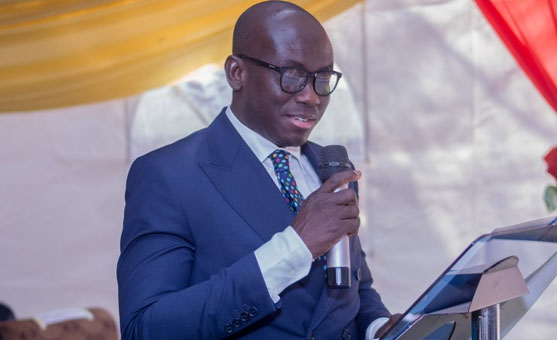On February 8, 2023, a letter from the Attorney General, Hon. Godfred Dame, addressed to Auditor-General Johnson Akuamoah Asiedu was made public.
In it, the Attorney General takes issue with the publication on the official website of the Auditor-General of the report of a special audit of the government of Ghana’s COVID-19 expenditures covering the period March 2020 to June 2022.
The Attorney-General is of the opinion that publication of the COVID-19 expenditures audit report by the Auditor-General is improper and even unconstitutional.
According to Attorney-General Dame the 1992 Constitution directs the Auditor General to submit his report to Parliament and for Parliament to debate on the report before the report could be deemed final and fit for public consumption.
In his view, “The constitutional duty of the Auditor-General to submit his reports to Parliament and Parliament’s consequential obligation to debate and scrutinize same will be ‘grossly prejudiced’ by prior publication of the report.”
The Attorney-General has, accordingly, made an unprecedented request to the Auditor-General to withdraw the Special Audit report on the COVID-19 expenditures.
First and foremost, the Attorney General’s claims are preposterous to say the least. Section 23(1) of the Audit Service Act, 2000 (Act 584) requires the Auditor General to “publish his reports . . . as soon as the reports have been presented to the Speaker to be laid before Parliament.” Nowhere in this or any other law, including the Constitution, is it suggested that the Auditor-General must wait until his report has been laid before or debated by Parliament before he may procced to make it public.
In any case, if, for the sake of argument, section 23 has been misunderstood, a report laid before Parliament is a public document to which the public cannot be denied access. It is curious and of great concern that the Attorney General has just recently discovered that the Auditor General’s regular practice of publication of the reports in compliance with statutory requirements constitutes a violation of the Constitution.
Secondly, the idea that somehow an audit report prepared by an external auditor (which is what the Auditor-General is to the State) after a series of comments from various entities and finalized, is then expected to be opened up through deliberations in Parliament and for Parliament to affirm the findings before the audit report is considered final and complete is anything but shocking.
Is the Attorney General suggesting that the explanations of public officers representing their entities captured on television should form the basis for altering the report? In no other jurisdiction is this a practice and in fact, offends the general principle of auditing.
In addition, are we to expect that the members of Parliament who serve on the boards of some these entities cited for irregularities are expected to now deliberate on findings implicating the very institutions they serve as board members? Is that truly the best way the government intends to protect the public purse?
Lastly, Article 187 of the 1992 Constitution has provided that during the audit process, the Auditor General has the power to disallow and surcharge individuals who have been determined to engage in illegalities and irregularities. Any individual aggrieved by the determination has the opportunity to seek redress from the High Court, not Parliament. Is the Attorney General suggesting that the deliberative role of Parliament has the capacity to alter that determination as well?
Sadly, this spurious argument has been peddled for a while, in spite of the fact that it makes no sense from a public financial management perspective. The framers of our Constitution could not have designed such a system. Parliament as the representatives of the shareholders of Ghana have a responsibility, comparable to that of the Board of a company, to ensure that the findings of the State’s external auditor are implemented to stop any misuse, misappropriation and stealing of public funds.
If Parliament was, in fact, performing dutifully its role of scrutinizing expenditure by the Executive as captured in the Auditor-General’s regular reports, it would insist that the Minister of Finance fully implement the many recommendations of the Auditor-General before a single Cedi of public money is appropriated for its further spending by Government.
This latest development unfortunately continues a domineering “superior-subordinate” posture that the Akuffo-Addo administration has adopted in its dealings with the constitutionally independent office of the Auditor General. We recall the actions taken by this Administration to force the former Auditor General Daniel Domelevo out of office.
This new assault on the Auditor General confirms our fears and concerns expressed at the time of Mr. Domelevo’s forced exit, that, if the Executive’s attempt to subordinate the Auditor-General to its will, is not met with strong push-back, we shall continue to see more of such efforts to undermine the independence of the office of the Auditor-General and other independent constitutional bodies.
Our perennial fiscal indiscipline, which has now brought our economy to its knees and turned our Republic into one of the IMF’s notorious recidivists, has vindicated our longstanding advocacy for more robustly independent accountability institutions to check and restrain Government in its spending behavior.
Unfortunately, the Attorney-General’s letter suggests that the opportunity that this crisis offers for Government to rethink and reform its ways and attitudes may be lost.
We urge the Auditor General to stay the course and not yield to pressure from any quarter to withdraw any audit report. Article 187(7)(a) makes it clear that, “in the performance of his functions under this Constitution or any other law, the Auditor-General shall not be subject to the direction or control of any other person or authority.”









































